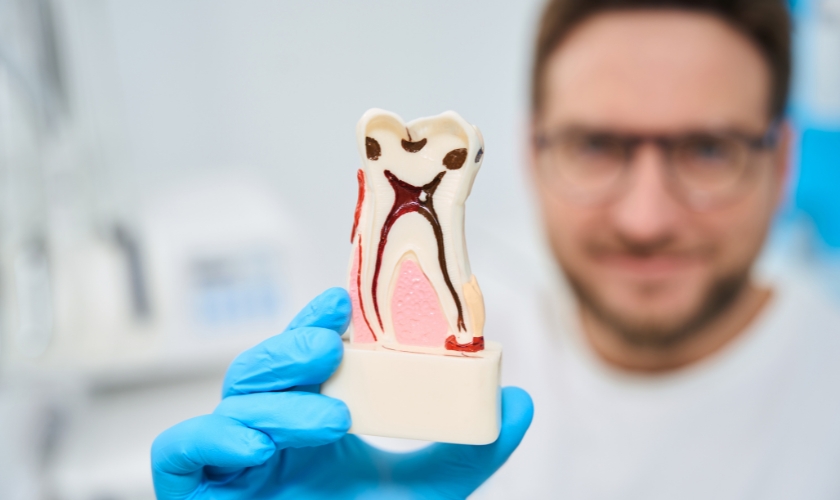Book An Appointment

Are you a diabetic patient who needs to undergo root canal treatment? Don’t worry, you’re not alone. Many individuals with diabetes find themselves facing this dental procedure at some point in their lives. However, there are a few important things that every diabetic patient should know before undergoing root canal treatment. In this blog post, we will explore five key considerations that can help ensure a successful and comfortable experience for those living with diabetes. So let’s dive right in and empower ourselves with the knowledge we need!
Blood sugar levels matter
Maintaining stable blood sugar levels is crucial for diabetic patients undergoing root canal treatment. Fluctuations in blood sugar can have a direct impact on oral health and the healing process post-treatment.
To numb the area being treated during a root canal, local anesthesia is administered. Diabetic patients should be aware that elevated blood sugar levels can affect the effectiveness of anesthesia, potentially leading to inadequate pain management during the procedure.
Uncontrolled diabetes can also slow down the body’s ability to heal itself. This means that diabetic patients may experience a longer recovery time after root canal treatment compared to non-diabetic individuals. It’s important to keep blood sugar levels under control before, during, and after the procedure to optimize healing and minimize any complications.
Moreover, high blood sugar levels create an environment where infections thrive. Root canal treatment involves removing infected dental pulp from within the tooth. However, if your blood sugars are not well-managed, you may be more susceptible to developing an infection or experiencing delayed healing following the procedure.
To ensure a successful outcome, it is essential for diabetic patients receiving root canal treatment to diligently monitor their blood sugar levels both before and after their appointment with their dentist. By working closely with your healthcare team and keeping your diabetes under control, you can increase the chances of a smooth recovery process without any further complications arising due to fluctuating blood sugars.
Pain management is important
Pain management is a crucial aspect to consider for diabetic patients undergoing root canal treatment. Managing pain effectively can contribute to a more comfortable and successful procedure. Keep these points in mind:
1. Discuss with your dentist: Before the procedure, have an open conversation with your dentist about your diabetes and any concerns you may have regarding pain management. They will be able to provide appropriate guidance and ensure that the necessary precautions are taken.
2. Local anesthesia: The use of local anesthesia is common during root canal treatment to numb the area being treated. However, diabetics may experience slower recovery from anesthesia due to their condition. It’s important for your dentist to take this into account when determining the dosage and monitoring its effectiveness.
3. Pain medication: Following the procedure, your dentist may prescribe pain medications such as nonsteroidal anti-inflammatory drugs (NSAIDs) or opioids if needed. It’s essential that you follow their instructions carefully and inform them of any adverse reactions or interactions with other medications you may be taking.
4. Proper oral care post-treatment: Maintaining good oral hygiene after a root canal is crucial for preventing infection and managing any residual discomfort or sensitivity. Be diligent about brushing twice daily, flossing regularly, and using an antimicrobial mouthwash recommended by your dentist.
5. Avoid exacerbating factors: Certain habits or substances can worsen post-procedure pain for diabetics, so it’s essential to avoid them while recovering from a root canal treatment.
The risk of infection increases
The risk of infection increases for diabetic patients undergoing root canal treatment. This is due to the fact that diabetes compromises the body’s ability to fight off infections effectively. When a tooth undergoes root canal treatment, it means that there is an existing infection deep within the tooth. If not properly managed, this infection can spread and cause serious health complications.
Diabetic patients need to be aware of this increased risk and take necessary precautions. It is important for them to maintain good oral hygiene by brushing and flossing regularly. They should also follow their dentist’s instructions regarding post-treatment care, which may include using antimicrobial mouthwashes or taking antibiotics if necessary.
In addition, diabetic patients should closely monitor their blood sugar levels before and after the procedure. Elevated blood sugar levels can impede the healing process and make it more difficult for the body to fight off infections.
Regular follow-up visits with the dentist are crucial for diabetic patients undergoing root canal treatment. These appointments allow dentists to assess the healing progress and detect any signs of infection early on. Prompt intervention can prevent further complications.
Managing the risk of infection is vital for diabetic patients during root canal treatment. By maintaining good oral hygiene, controlling blood sugar levels, and keeping up with follow-up visits, they can minimize potential risks and ensure a successful outcome.
Follow-up visits are essential
Follow-up visits are essential for diabetic patients undergoing root canal treatment. These appointments play a crucial role in ensuring the success of the procedure and maintaining overall oral health.
During follow-up visits, your dentist will closely monitor the healing process of your tooth and evaluate any potential complications. This is particularly important for diabetic patients as they may have slower healing times and increased susceptibility to infections.
Regular check-ups allow your dentist to assess how well your blood sugar levels are controlled. Fluctuating blood sugar can hinder proper healing and increase the risk of infection. By monitoring these levels, adjustments can be made to medication or insulin dosage if necessary.
Additionally, follow-up visits provide an opportunity for professional cleaning and maintenance. Diabetic individuals are more prone to gum disease, so it’s essential to keep their teeth clean and free from plaque buildup.
Your dentist will also examine other teeth during these appointments to address any new cavities or issues that may have arisen since the root canal treatment was performed. Early detection is key in preventing further complications.
Regular follow-up visits are vital for diabetic patients undergoing root canal treatment as they help ensure optimal healing, control blood sugar levels, prevent infection, maintain oral hygiene, and address any additional dental concerns that may arise in a timely manner.
The cumulative effect on teeth
Diabetes affects various aspects of our health, and our dental health is no exception. When it comes to diabetes and root canal treatment, understanding the cumulative effect on teeth is crucial. Over time, uncontrolled blood sugar levels can weaken the immune system, making diabetic patients more susceptible to oral infections.
One of the main concerns for diabetics undergoing a root canal procedure is the risk of tooth decay. High blood sugar levels create an ideal environment for bacteria to thrive in the mouth, leading to cavities and gum disease. These conditions can further compromise the health of already weakened teeth.
Additionally, diabetes can affect the healing process after a root canal treatment. Poorly controlled blood sugar levels may delay or hinder proper tissue regeneration around the treated tooth. This could result in prolonged discomfort and increased susceptibility to reinfection.
Regular follow-up visits with your dentist are essential for diabetic patients who have undergone a root canal treatment. These appointments allow your dentist to monitor your oral health closely and make any necessary adjustments or interventions if needed.
Taking care of your overall dental hygiene becomes even more important when you have diabetes. Brushing twice daily with fluoride toothpaste, flossing regularly, and using an antimicrobial mouthwash can help prevent further complications from arising.
It’s important for diabetic patients undergoing root canal treatment to be aware of how their condition can impact their dental health. By maintaining good oral hygiene practices and keeping their blood sugar levels under control, they can minimize potential risks and enjoy healthier teeth in the long run.
As we wrap up this article, it’s important to remember that root canal treatment can be a viable option for diabetic patients with dental issues. However, there are several key considerations to keep in mind before undergoing the procedure.
First and foremost, blood sugar levels play a crucial role in the success of root canal treatment. It is essential to have your diabetes under control and consult with your dentist or endocrinologist to ensure that your blood glucose levels are stable before proceeding.
Pain management during and after the procedure is another critical factor for diabetic patients. Proper anesthesia and pain medication should be administered by your dental professional to help minimize discomfort throughout the process.
Diabetic individuals also need to be aware that their risk of infection increases due to compromised immune systems. Consequently, extra precautions may be necessary both during and after the root canal treatment, such as ensuring proper oral hygiene practices and taking any prescribed antibiotics.
Follow-up visits are an integral part of successful root canal treatment for diabetics. Regular check-ups allow dentists to monitor progress, address any concerns promptly, and ensure optimal healing.
It’s vital for diabetic patients undergoing multiple root canal treatments or other dental procedures like dental implants to consider the cumulative effect on their teeth. Maintaining good oral health habits such as regular brushing, flossing, and routine dental cleanings can help prevent future complications.
In conclusion (without using those words), while a diabetic patient may face some unique challenges when considering root canal treatment, with proper planning and communication between healthcare professionals involved in their care – such as dentists and endocrinologists – it is possible for them to undergo these procedures successfully. By managing blood sugar levels effectively through appropriate medical intervention coupled with diligent post-treatment care at home, they can restore their oral health without compromising overall well-being.
FAQ
Q: Can diabetics undergo root canal treatment?
A: Yes, diabetic patients can undergo root canal treatment. However, it is important for them to manage their blood sugar levels effectively and communicate with their dentist about their condition.
Q: Is pain management different for diabetic patients during a root canal?
A: Pain management may differ slightly for diabetic patients due to the potential impact of diabetes on the body’s healing process. Dentists will take this into consideration and adjust medication accordingly.
Q: Are diabetics more at risk of infection after a root canal?
A: Diabetic patients have a higher risk of infection in general, including after dental procedures like a root canal. It is crucial for them to follow proper oral hygiene practices and attend all recommended follow-up visits.
Q: How many follow-up visits are necessary after a root canal?
A: The number of follow-up visits required may vary depending on each individual case. Generally, dentists recommend at least one or two check-ups within the first year following the procedure to ensure successful healing.
Q: What is the cumulative effect of diabetes on teeth over time?
A: Diabetes can have several negative effects on oral health over time. It increases the risk of gum disease, tooth decay, dry mouth, and delayed wound healing in the mouth area.





